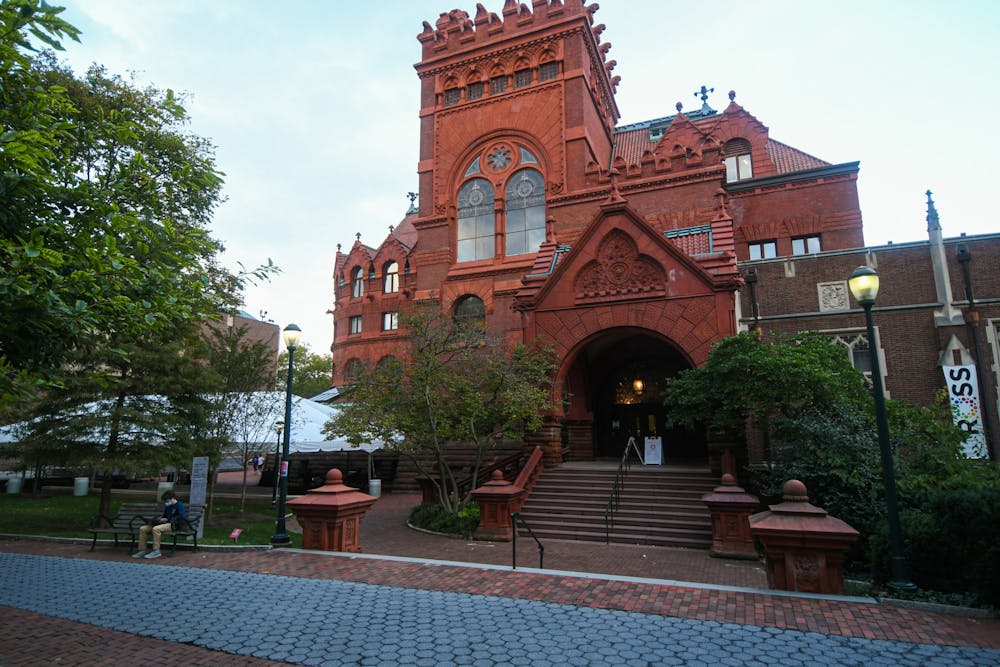
Fisher Fine Arts, one of Penn's libraries, on Sep. 28, 2021.
Credit: Gundappa SahaPenn Libraries will be open and operating with Winter Break hours until in-person classes resume. Access to Penn Libraries is limited to only Penn community members through Jan. 23.
As a continuation of their Winter Break operating hours, most libraries are open under shortened hours. Students can still reserve group study rooms during these hours, and students are still permitted to eat and drink in the library as long as they follow social distancing and are in accordance with the food and drink policy.
Van Pelt Library is open on Monday to Friday from 9 a.m. to 5 p.m. and Saturday to Sunday from 10 a.m. to 6 p.m. The Undergraduate Study Center in Van Pelt is open until midnight on Jan. 12, 13, 18, 19, and 20. Fisher Fine Arts Library is open on Monday to Friday from 9 a.m to 5 p.m and is closed on Saturday and Sunday.
The libraries have shortened their hours to be “consistent” with the university’s virtual environment and as a health and safety measure to mitigate the spread of COVID-19, according to Associate Vice Provost and Deputy University Librarian Jon Shaw.
“We want everyone to stay as safe as possible. The library is continuing to be one of the safest spots on campus, and we do that with the partnership of students in having good practice,” Shaw said.
Shaw also said that there is less demand for library use because there are fewer students on campus during virtual classes. Students who need to access the library’s resources can “visit the library in its virtual format” through the HathiTrust Emergency Temporary Access Service to access copyrighted material, Shaw said.
Some students were relieved to hear the libraries would be opening during the virtual learning period, citing improved mental health and motivation to work.
College first-year Sophie Howery said that she uses the Penn's libraries as a place to study which benefits her mental health.
“Being cooped up in my room the entire day would be really bad for mental health. So I think it's really a great thing the libraries are open,” Howery said.
Timethius Terrell, a College sophomore, agreed with Howery, saying that studying at the library has helped him to feel motivated.
Although students are glad that the libraries are open, some added that they will have to change their study habits and schedules because of the shortened hours.
College first-year Grace Edwards said, as a pre-med student, she usually goes to the library after class, spending up to ten hours per day at the library. She lives near campus, but now plans to do most of her studying in her room until she moves in for the spring semester.
Terrell added the study habits that he began to develop towards the end of the fall semester may be disrupted. Both Howrey and Terrell have virtual classes that end after the library closes, so they plan to seek alternate study spaces.
One student, however, who has a work-study job at Biotech Commons said they are uncertain about their work schedule and the shortened hours. The student — who requested anonymity for fear of losing their job — said that, at the time of the interview, there had been no communication from the library about scheduling, and it was not clear when they were able to start working.
“I wish that someone had emailed us in advance. Most of the communication has been through word of mouth than it has been through the libraries themselves,” they said.
Shaw said that the libraries are currently engaging all the work-study students who were working during the fall semester. He added that the libraries will be continuing to hire as students arrive back on campus.
“A majority of our work-study students aren’t even on campus yet. There’s no ability to set schedules without students there,” Shaw said.
Some students felt that Penn’s COVID-19 mitigation policies in previous semesters did a good job of preventing transmission in the library.
The anonymous student worker, for example, said they had few concerns about COVID-19 transmission at their job because Biotech Commons checks each entering person's PennOpen Pass and patrons are respectful of social distancing.
Howery also said she felt confident that COVID-19 transmission at the library is low due to promising data on in-person classroom transmission last semester. Terrell, Edwards, and Howery all agreed that Penn’s gateway testing requirement made them feel safe.
“What is encouraging is knowing that we'll all be tested before we come on campus. We'll take precautions and hopefully those precautions will be sufficient enough to calm some of the fear,” Edwards said.
The Daily Pennsylvanian is an independent, student-run newspaper. Please consider making a donation to support the coverage that shapes the University. Your generosity ensures a future of strong journalism at Penn.
Donate






